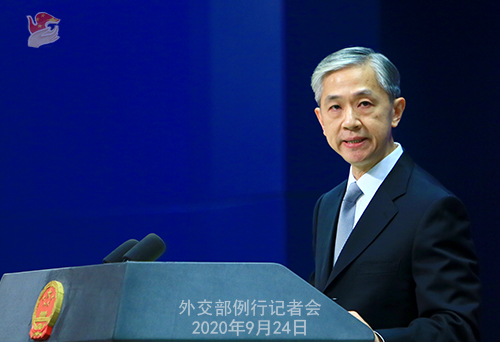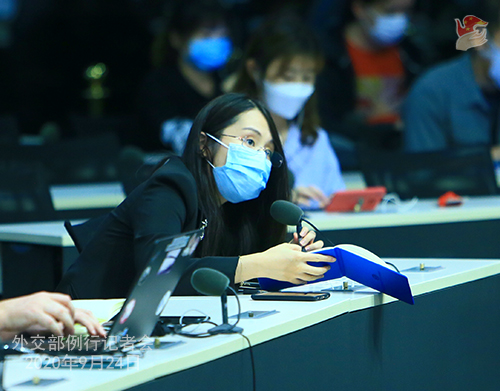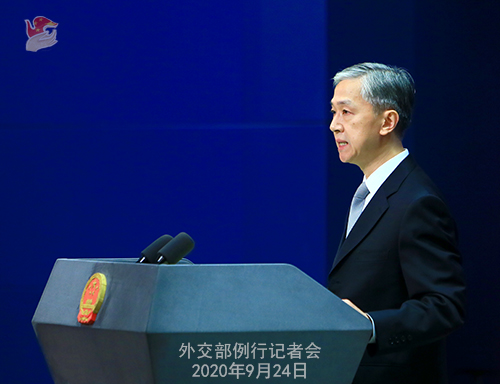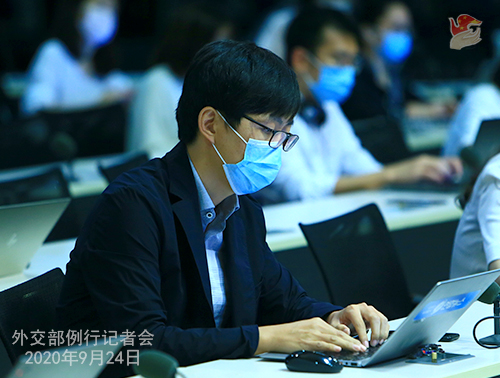| Foreign Ministry Spokesperson Wang Wenbin's Regular Press Conference on September 24, 2020 |
| 2020-09-24 22:21 |
|
On September 23, China's Ministry of Foreign Affairs and National Immigration Administration jointly published the following announcement on the reopening of border to foreign travelers holding three categories of valid residence permits. In light of the current COVID-19 situation and the need of epidemic prevention and control, adjustments are now made to the Announcement by the Ministry of Foreign Affairs and the National Immigration Administration on the Temporary Suspension of Entry by Foreign Nationals Holding Valid Chinese Visas or Residence Permits, which was issued on 26 March 2020. Effective from 0 a.m., 28 September 2020, foreign nationals holding valid Chinese residence permits for work, personal matters and reunion are allowed to enter China with no need to apply for new visas. If these three categories of residence permits held by foreign nationals expired after 0 a.m., 28 March 2020, the holders may apply for visas by presenting the expired residence permits and relevant materials to the Chinese embassies or consulates on the condition that the purpose of the holders' visit remains unchanged. The above-mentioned personnel shall strictly abide by the Chinese regulations on epidemic prevention and control. Other measures in the March 26 Announcement will continue to be implemented. While ensuring effective epidemic control, China will continue resuming people-to-people exchanges in a step-by-step and orderly manner. Bloomberg: According to a new report by the Australian Strategic Policy Institute (ASPI), China is continuing to invest in detention camps in Xinjiang. What's the foreign ministry's comment on this? Wang Wenbin: There was never any "detention camp" in Xinjiang. As to the fact-distorting reports on China churned out by the ASPI, we have responded repeatedly. As reveled by sources in Australia, this institute has long been receiving funding from the US government and arms dealers. Its passion lies in concocting and sensationalizing anti-China topics. Imbued with ideological prejudice, it is practically an anti-China "vanguard" whose academic integrity is in serious question. The ASPI has come under wide criticism for what it has done and stands as a laughing stock in the world. We hope and trust that people will all see through and reject the ludicrous findings of such anti-China organizations. Reuters: US Secretary of State Mike Pompeo said on Wednesday that he warned US politicians at the state and local levels to be vigilant around Chinese diplomats as they are part of Beijing's propaganda and espionage campaign. What's the foreign ministry's comment? Wang Wenbin: Subnational cooperation and people-to-people and cultural exchange is an integral part of China-US relations. It is the two peoples' shared wish to enhance such exchange, which serves the interests of both sides. China is not interested and has never interfered in US domestic affairs. Chinese diplomatic posts and civil organizations in the US always act in accordance with international law and bilateral agreements. Their interaction with US governments at various levels aim to deepen the two countries' mutual understanding, exchange and cooperation. It is totally above-board and beyond reproach. Pompeo's remarks are shameless lies with no respect for facts. China firmly rejects them. We have also seen quite some criticism on him in the US, pointing out that his speech is clearly motivated by selfish political gains and that he is merely using foreign policy as a cover in the service of domestic agenda. Some American politicians have lately been suffering from an anti-China paranoia. They keep vilifying Chinese institutions and individuals' normal activities in the US and hyping up threat posed by China to obstruct normal exchange and cooperation and secure political gains. This will continue to be condemned and rejected by insightful people from all communities in the US. Once again we urge the like of Pompeo to discard Cold War mentality and ideological bias, respect facts, stop fabricating all sorts of lies about China, and stop disrupting and jeopardizing normal exchange and cooperation between China and the US. CNR: Also a question related to the US Secretary of State Mike Pompeo. He lashed out on the human rights conditions in China, Iran and Venezuela. What is China's response? Wang Wenbin: The US is feeling very comfortable with playing the role of "a human rights preacher", condescendingly harping on others' human rights conditions. But the fact is that its own human rights record is terrible enough. The cries of "I cannot breathe" and "Black Lives Matter" resound all over the world. The UN Human Rights Council recently adopted a resolution in strong condemnation of the severe racial discrimination in the US. The US should know better and start by owning up to and addressing its own problems. The Chinese government attaches great importance to promoting and protecting human rights, a commitment that puts people front and center. China has lifted 850 million people out of poverty, achieved the SDG on poverty eradication ten years ahead of schedule, put in place systems for education, social insurance, medical care and grassroots democracy unparalleled in scale worldwide, and in accordance with law guaranteed its citizens rights to freedom of speech and religious belief and ethnic minorities' rights to participate in the governance of state affairs. The Chinese people's rights are effectively protected. When China's human rights record was examined for the third time by the UN Human Rights Council's Universal Periodic Review mechanism, more than 120 countries expressed support for and appreciation of China's progress and its contribution to the global human rights cause. According to a study by the Ash Center for Democratic Governance and Innovation at the Harvard Kennedy School, the Chinese people's overall satisfaction towards the Central Government exceeds 93%. No country can claim to have attained perfection on human rights. China is willing to have equal-footed, mutually respectful exchanges with other countries to jointly move forward the global human rights cause. But we need no "human rights preacher" and oppose applying double standards, distorting facts and fabricating lies. We are against using human rights issue to interfere in others' internal affairs.
Beijing Daily: The latest report published by UNCTAD on September 22 pointed out that the global economy will contract this year by 4.3%, but the Chinese economy is still expected to grow. An UNCTAD official said that "China has a lot of domestic space to be able to manage a strong recovery", and noted the belief that China's steady growth will provide opportunities for the world economic recovery. What's your comment on this? Wang Wenbin: China has secured major strategic outcomes of the battle against COVID-19. With the economy on a steady and upward trend and normalcy returning to production activities and daily life, we have become the first major economy that resumes positive growth after the pandemic broke out. China's economic recovery will be a strong impetus for the world. While effectively preventing and containing the virus, China will continue facilitating the operation of transnational business by launching more fast lanes and green lanes for the exchange of personnel and goods. We will deepen reform and opening up, continue to ease market access and protect foreign companies' legitimate rights and interest to ensure a level playing field for both domestic and foreign enterprises. China is ready to work with all countries to make coordinated efforts to contain the epidemics and develop the economy, so that the virus will be defeated and the world economy will be booming again at an early date. Reuters: The Global Times reported that two Australian academics, Clive Hamilton and Alex Joske, have been barred from entering China. What's the foreign ministry's comment? Wang Wenbin: Whether or not to grant entry to foreign nationals is a matter of sovereignty. Foreign nationals are welcome to China for work, study or other purposes. We hope they will faithfully represent China's national conditions and domestic and foreign policies and work to promote the mutual understanding between China and the rest of the world. That being said, we are firmly opposed to behaviors that use academic study as a cover to spread disinformation, deliberately attack China and endanger China's national security. China's position on developing relations with Australia is consistent and clear. A sound and stable relationship serves the fundamental interests of the two countries. The crux of the current difficulties in China-Australia relations is the Australian side's repeated erroneous words and deeds on issues concerning China's core interests including sovereignty and territorial integrity and its wanton restrictions on normal exchange and cooperation between the two sides, which gravely harmed mutual trust. We urge certain people in Australia to reject Cold War mentality and ideological bias, see China in an objective and rational light, stop smearing and vilifying China, and work to enhance mutual understanding and trust, not the contrary. China Daily: European Commission President Ursula von der Leyen said on September 23 that he welcomes China's ambition to curb emissions and achieve carbon neutrality as proposed by President Xi Jinping and they will work with China on this goal. Do you have any comment? Wang Wenbin: As announced by President Xi Jinping at the UNGA General Debate, China aims to have CO2 emissions peak before 2030 and achieve carbon neutrality before 2060. The international community has commended this as a manifestation of responsibility and leadership. The targets will provide important political support for the COP26 of the UNFCCC to be held next year, produce a major impact on the global low-carbon transformation, and set a good example for climate action across the world. Actively addressing climate change is not only the intrinsic need for China to realize sustainable development at home, but also a mission it has undertaken as a major country for the building of a community with a shared future for mankind. With a shared stake in the climate of our planet, China stands ready to work together with the EU to implement our leaders' important consensus, forge a green partnership and earnestly fulfill obligations set out in the UNFCCC and Paris Agreement. We will remain committed to the new concept of innovative, coordinated, green, open and shared development, deepen international cooperation on addressing climate change, promote a green recovery of the world economy in the post-COVID era, and contribute to sustainable development around the world. RIA Novosti: Belarus President Lukashenko yesterday was sworn in office with an inaugural ceremony. Some countries and organizations, for example the European Union and the US, already refused to recognize him as the legitimately-elected president of Belarus. I wonder if China have any comment on the situation there? Wang Wenbin: China respects the Belarusian people's independent choice. The presidential election is Belarus' internal affair. China firmly supports Belarus' efforts to uphold national independence, sovereignty, security and development, and firmly rejects the attempts of external forces to split the country or create chaos. China hopes and believes that under President Lukashenko's leadership, Belarus will resume political stability and social tranquility.
NHK: Can you confirm that Japan's new prime minister and the Chinese leadership will talk over the phone? What's China's expectations of Japan's new government? Wang Wenbin: China attaches importance to high-level interactions with Japan which is of great significance in guiding the improvement of bilateral relations. We are ready to work with the new Japanese government for fresh progress in bilateral ties. On your question though, I have no specific information at the moment. Yonhap News: The Japanese Prime Minister Yoshihide Suga and ROK President Moon Jae-in talked on the phone this morning. Does China have any comment on this? Wang Wenbin: I haven't read reports on that. We hope the ROK-Japan relationship can develop in a stable and sound manner. Prasar Bharati: Yesterday G4 countries in a joint press statement has called for start of text-based negotiations for reforms at the UN Security Council as there is lack of meaningful movement forward at inter-governmental negotiations. What is China's comment? Wang Wenbin: The UN Security Council, as the core of the international mechanism for collective security, should be reformed to better fulfill its mandate under the UN Charter. We believe the reform should increase the representation and say of developing countries, so that more small- and medium-sized countries can have the opportunity to participate in the UNSC decision making. The UNSC reform is very important as it concerns the UN's long-term development and the immediate interests of all member states. At present, vast differences persist among various sides, and a wide consensus on the reform plan is yet to be reached. China will continue working with other members to find a package solution through dialogue and consultation, which will accommodate the interests and concerns of all sides. Bloomberg: TikTok's owner ByteDance asked a federal judge to stop enforcing a US government ban that would remove the app from US app stores. Separately, yesterday both China Daily and the Global Times hinted that China would not approve the deal between TikTok and Oracle. My question is, under what conditions will China approve the TikTok deal? Wang Wenbin: I took similar questions the other day. I'd like to reiterate that China urges the US to respect the principles of market economy and fair competition, observe international trade rules, stop politicizing normal trade and economic cooperation, and foster an open, fair, just and non-discriminatory business environment for foreign companies operating and investing in the US. China supports the companies concerned in defending their legitimate rights and interests through legal means, and will continue taking all necessary measures to firmly safeguard Chinese companies' rights and interests. Regarding your question, I'd refer you to the competent authorities. Bloomberg: The Office of the Commissioner of the Ministry of Foreign Affairs in the HKSAR said on Wednesday that it urged the Foreign Correspondents' Club (FCC) in Hong Kong to stop provoking trouble on purpose. This is in relation to recent event whereby the club has come out and made some comments about new policy measures regarding the media in Hong Kong. Does the foreign ministry have any further comment or insight into this? Wang Wenbin: I believe you are referring to the Hong Kong police force's amendment of the Police General Orders. The police has already stated that doing so will help it assist the press without affecting the efficiency of its operations, which will help safeguard the legitimate rights of recognized media outlets and journalists. I want to stress that China upholds rule of law and Hong Kong enjoys law and order. Media practitioners in the HKSAR should abide by national laws applied to Hong Kong and local laws and voluntarily receive legal supervision. As long as foreign media and journalists comply with laws and conduct reporting in accordance with laws and regulations, their lawful rights will be fully guaranteed. We support relevant authorities of the SAR government in stepping up management of and services for the media sector according to law. As to the statement by FCC Hong Kong, the Office of the Commissioner of the Ministry of Foreign Affairs in the HKSAR already stated its position. FCC Hong Kong should immediately stop meddling with Hong Kong affairs on the pretext of press freedom.
|
| |||||||||||||||
|
|||||||||||||||





